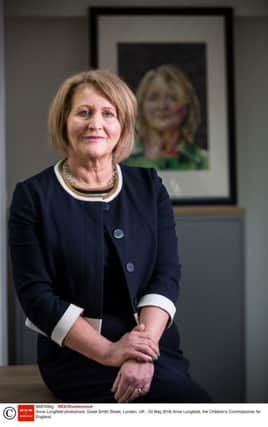Early intervention needed for vulnerable young people, children's commissioner Anne Longfield warns


Anne Longfield OBE, is the representative of all children in England, in particular giving an authoritative voice to those in care. She is also from Yorkshire, having been brought up in the market town of Otley and attending Prince Henry’s Grammar School.
Across the country, she warns, austerity funding and the loss of Sure Start and early years provision means too many young people are being reached too late, their troubles ricocheting into crisis without early intervention.
Advertisement
Hide AdAdvertisement
Hide AdThe “worrying” impact, she adds, is the fear that the most vulnerable are falling through the gaps, authorities now firefighting to support them and with costs spiralling as a result.
“It’s undoubtedly the case that the number of children going into care is increasing,” she told The Yorkshire Post. “There’s been a real fall in the money spent on prevention, on Sure Start, and there is less money available early on, less money to prevent things getting out of control.
“But that means costs rise and rise. It means we are not helping children when we first realise there is a problem. We are allowing those problems to get worse, and are only able to help when crisis hits.
“As parents, with our own kids, we would say that’s a terrible strategy. If there was a car, careening down the road towards a child, nobody would debate the responsibility of anyone who pulled them out of the way to stop a disaster happening.
Advertisement
Hide AdAdvertisement
Hide Ad“As all public services reduce budgets, fewer are able to step out. More and more children fall through the gap.”
There are rising numbers of children in care across the country, with some authorities warning they face acute challenges in children’s services budgets. Nationwide, in the past two years, there has been a seven per cent increase in so-called ‘looked after’ children. In Yorkshire, that figure is at 13 per cent rise.
Citing findings from the Institute for Fiscal Studies, Ms Longfield warns that almost half of the entire £8.6bn children’s services budget in England is now spent on 73,000 children in the care system. Nearly three quarters is spent on those in severe need, she said, adding that there have been cases where £1m has been spent on provision for a single teenager.
Early intervention is critical, she says, so that children, young people and their families have support at those times when things start to go wrong – and not when they hit crisis.
Advertisement
Hide AdAdvertisement
Hide Ad“Some children do need extra help and support, at times,” she said. “With that, they can not only get by but flourish.“But if they don’t have that, and a problem comes along such as parent illness or they fall behind at school, that then ricochets it up to another level of vulnerability.
“We are playing loose with the risks these children are having to carry in their lives. Any period of time for them, even two or three years, is a lifetime for a child.
“That’s the difference between them having a difficulty and being able to overcome it, to falling out of school, going into care, and everything that brings. Often, these are the hidden children, and we don’t see them until they hit the headlines.”
While the figures show a rising number of children in care, there are many more, she adds, that are identified as vulnerable or in need of intervention.
“When we ask local authorities what would make a difference and turn the tide, they say early help. Especially in the early years. And working with not just the child, but the whole family.”